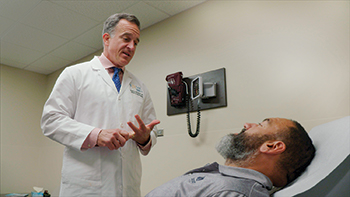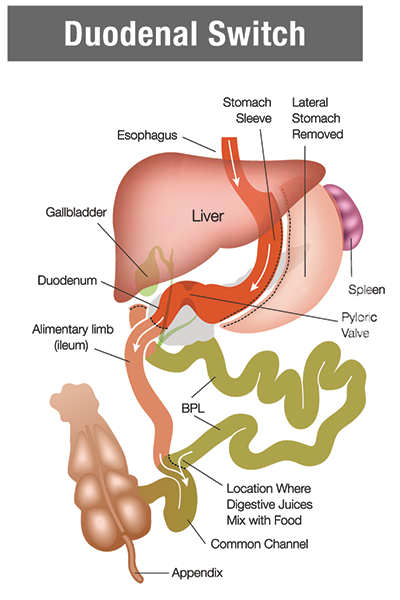
Health Expert

When an emergency room visit in January 2022 revealed Anthony Espino, 38, had high blood pressure, high cholesterol and Type 2 diabetes, he and his wife, Brittany, knew they needed to make a change. They were both overweight, weighing more than 400 pounds and 330 pounds, respectively. Anthony went from not needing medications to suddenly taking several to manage his health issues. They wanted to live healthier to get rid of his conditions and reduce Brittany’s risk of developing them.
“When he was first diagnosed, I was scared,” Brittany Espino, 33, said. "It was very eye-opening. I realized we couldn’t keep going the way we were going.”
Anthony and Brittany, of Lee’s Summit, MO, had tried several weight loss methods, like dieting and exercising, to no avail. In the spring of 2022, they made the decision to get weight loss surgery together. Of the three surgical options offered by the Total Weight Loss Center (TWLC) at North Kansas City Hospital, they chose the modified duodenal switch surgery. This 90-minute minimally invasive procedure promotes weight loss by reducing the stomach size and manipulating the way food travels through the gastrointestinal (GI) tract.
“The duodenal switch surgery provides the most percentage of weight loss for patients and is more likely to help get rid of diabetes,” said Keenan Berghoff, MD, bariatric surgery medical director.
In It Together
That eye-opening emergency room visit showed Anthony had a blood pressure of 190/85 mmHg and a blood sugar reading well over 500 mg/dL. A healthy blood pressure is 120/80 mmHg or lower, and a healthy blood sugar reading should be approximately 100 mg/dL. Consistently high blood pressure and blood sugar can increase one’s risk of heart disease, stroke, kidney disease and many other complications.
After his diagnosis and in preparation for their surgeries, Anthony and Brittany attended several supervised weight-loss visits with a dietitian and psychologist. They learned about post-surgery lifestyle and diet changes crucial to losing weight and keeping it off. While they awaited their surgeries, they got a head start on lifestyle and diet changes.
“They were engaged in the whole process and did everything we asked them to do,” said Michelle Garcia, RDLD, TWLC dietitian. “They tackled the diet changes, worked out and ate the recommended 75 grams-90 grams of protein daily because they really wanted to do it right.”
Along with diet changes, they committed to the fitness trend, The 75 Hard Challenge. The rules of the challenge are the same each day:
- Complete two 45-minute workouts, with one outside.
- Drink 1 gallon of water.
- Follow a diet of your choice, without alcohol or cheat meals.
- Read 10 pages of a book.
- Take a progress picture.
“The challenge held us accountable, and we each lost 40 pounds,” Brittany said. “When I look back at my photos from the challenge and before surgery to now, I feel accomplished for the progress I’ve made.”


Make the Switch
What is BMI?
Body mass index (BMI) is a measurement that estimates a healthy body weight based on your height. It will inform you if you’re underweight, at a healthy weight, overweight or obese. Anyone with a BMI of 30 or higher is considered obese and at a higher risk of premature death due to serious weight-related health conditions, including heart disease, high blood pressure, sleep apnea, stroke and Type 2 diabetes.
To qualify for weight loss surgery, you must be open to lifestyle and diet changes, have at least one obesity-related medical condition and have a body mass index (BMI) of 30 or greater. (Learn more about how BMI helps identify bariatric surgery candidates at right.) Prior to starting their weight loss journey, Anthony’s BMI was 56 and Brittany’s was 54.
Dr. Berghoff, TWLC bariatric surgeon, performed the duodenal switch surgery on Anthony and Brittany in October 2022. “A growing body of research suggests lifestyle and behavior changes do not result in sustained, significant weight loss for overweight individuals,” Dr. Berghoff said.
About 90% of duodenal switch patients maintain their weight loss for more than 10 years.
“Successfully losing weight with this procedure not only reduces the risk of developing an obesity-related disease, but it often improves or eliminates these conditions altogether,” Dr. Berghoff added.
During this procedure, about 75%-80% of the stomach is removed, creating a tube-shaped stomach. Part of the small intestine is divided into two sections to shorten the distance food needs to move through the GI tract. The rest of the small intestine is reconnected to the outlet of the newly formed stomach, so acid and enzymes needed for digestion get incorporated into the food stream.
After an overnight stay in the hospital, patients must stay on a liquid diet for seven days and then add food back slowly over a seven-week period. Patients are warned to be careful when they begin eating solid foods again because their stomachs are much smaller. It’s important to chew thoroughly, eat small portions and listen to body cues, like feeling satisfied and full, to avoid getting sick or hurt.
Gratitude

Anthony and Brittany are down over 160 pounds each since they began their weight loss journey. Now they have more energy during their Disney vacations and when they attend sporting events with their niece and nephew.
“Before my surgery, I felt sluggish with no motivation or energy to get up and get moving,” Anthony said. “Now I have more energy than I know what to do with. I feel better than I have in a long time.”
They attribute much of their success to the care, guidance and support they received at the TWLC.
“The care team truly cared for our needs and helped us feel heard and safe,” Brittany said. “They provided so much information and guidance, we felt well prepared to continue on our weight loss journey together.”

Total Weight Loss Center
NKCH’s Total Weight Loss Center offers surgical and medical weight loss options along with behavior, exercise and nutrition support services. Anyone interested in bariatric surgery should contact their insurance company to confirm requirements.
To qualify for weight loss surgery, you must:
- Be open to lifestyle and diet changes
- Have at least one obesity-related medical condition
- Have a body mass index (BMI) of 30 or greater